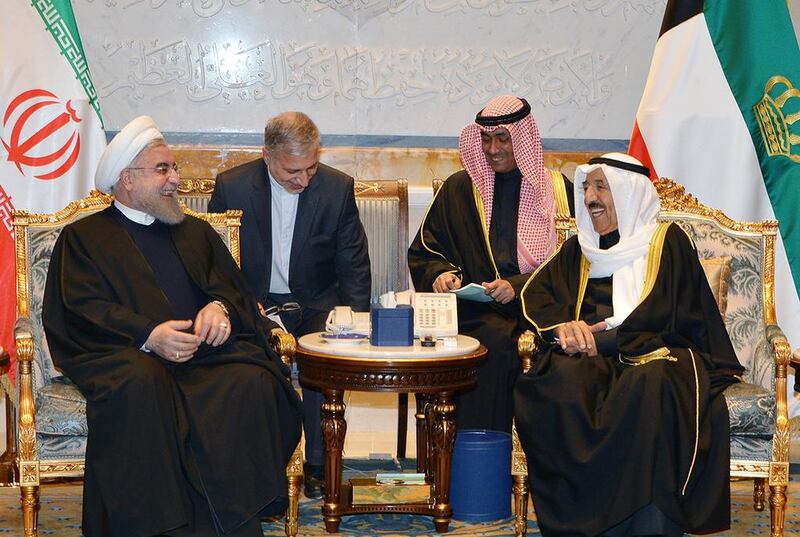In the past two years, many geo- political developments have significantly ratcheted up tensions between Iran and the GCC. Diplomatic ties between Iran, Saudi Arabia and Bahrain have been strained. In addition, many other Gulf states downgraded their relationships with the Islamic Republic. These diplomatic strains appear to have increased security dilemmas and concerns in the region.
Despite the grim outlook, there appears to be a new sense of hope that it may be possible to mend ties between Iran and the GCC states.
Iran’s president, Hassan Rouhani, has recently visited Kuwait and Oman, which have stronger relations with Tehran, when compared to other GCC states.
The likelihood of success of these diplomatic initiatives is high, given Tehran’s current strategic interest in repairing ties with the GCC states, specifically with Saudi Arabia.
Iranian leaders have been saying that the moves to improve diplomatic ties between Iran and the Gulf states were initiated by the latter. Previously, Mr Rouhani emphasised that more than 10 countries had tried to improves ties between Iran and Saudi Arabia. Iranian leaders also pointed out that Kuwait sent an official letter to Iran inviting it to join a dialogue aimed at improving relations between Tehran and the Gulf countries. The reason behind such statements is that Iran’s moderates want to bolster the country’s image as an indispensable regional power to satisfy hardliners’ ambitions. This is also an effective way to appeal to the nationalistic sentiments. Tehran is also trying not to show weakness or accept any blame for the previous developments that contributed to the escalation of tensions, especially after the burning of the Saudi embassy in Tehran.
However, Iran’s hardliners will now look for a diplomatic thaw between Tehran and Riyadh, as they are aware that the Trump administration is likely to continue to lean towards the Gulf states. Iran is concerned that the GCC might persuade the Trump administration to take a tougher stand against Tehran to curb its regional ambitions.
Iranian leaders are also concerned that diplomatic strains between Tehran and the GCC could lead to a convergence of geopolitical interests of some Gulf states and Israel. All this could lead Iran to engage in diplomacy with the GCC.
Iran’s interest in the diplomatic drive may be robust, but that’s a temporary tactical shift aimed at gaining a better understanding of the Trump administration’s Iran policy.
On the other hand, improved relationships between Iran and the GCC could have a significant impact on geopolitical, economic and security landscapes of the region. In other words, if these diplomatic initiatives succeed, the region might witness more stability and security that would preserve the economic, political and strategic interests of all parties.
Many steps can be taken to ensure the success of these diplomatic initiatives. First, both sides can reach an understanding over their geopolitical and strategic priorities. Secondly, concessions need to be made to preserve their prioritised interests. Such an understanding was reached between Iran and Syria when both were fighting each other through proxies in Lebanon in an attempt to exert their influence. In order to save their embattled relations, Tehran and Damascus agreed that the former would respect Syria’s interests in Lebanon, while Syria would help Iran to increase its influence in other Arab states.
For Saudi Arabia, Yemen is the focus of security and geopolitical priorities. As a result, Iran’s Revolutionary Guard Corps and its elite branch, the Quds force, should withdraw their military, advisory and financial support to the Houthis. For Iran, on the other hand, its influence and presence in Iraq and Syria appear to be top priorities.
But these diplomatic possibilities, though promising, should not raise hopes and expectations significantly. The underlying tensions between Iran and some Gulf states are too deep to completely vanish.
From the Iranian perspective, the underlying tensions are multifaceted with five dimensions – geopolitical, sectarian, ethnic, religious and strategic. Will these diplomatic initiatives fundamentally alter Iran’s foreign policy? The answer perhaps is no. Iran’s political priorities such as its Syria policy, supporting Hizbollah in Lebanon and the Shiites in Bahrain and siding with the Iraqi government and Shia groups will not fundamentally change. No prior initiatives, even the historic rapprochement between Iran and the United States, or the nuclear agreement between Iran and P5+1, altered the main pillars of Iran’s foreign policy.
Since it is in Iran’s best interests these diplomatic initiatives could be successful, but they would be temporary because Iran has made a calculated tactical shift rather than a fundamental strategic shift in its policy.
This might contain the heightened regional tensions for a short time, but it will not fundamentally resolve the regional conflicts, nor will it remove or address the underlying tensions between the GCC and the Islamic Republic.
Dr Majid Rafizadeh is an Iranian-American scholar and president of the International American Council on the Middle East
On Twitter: @majidrafizadeh





